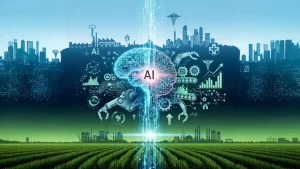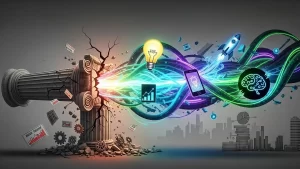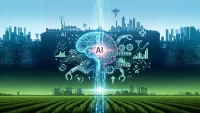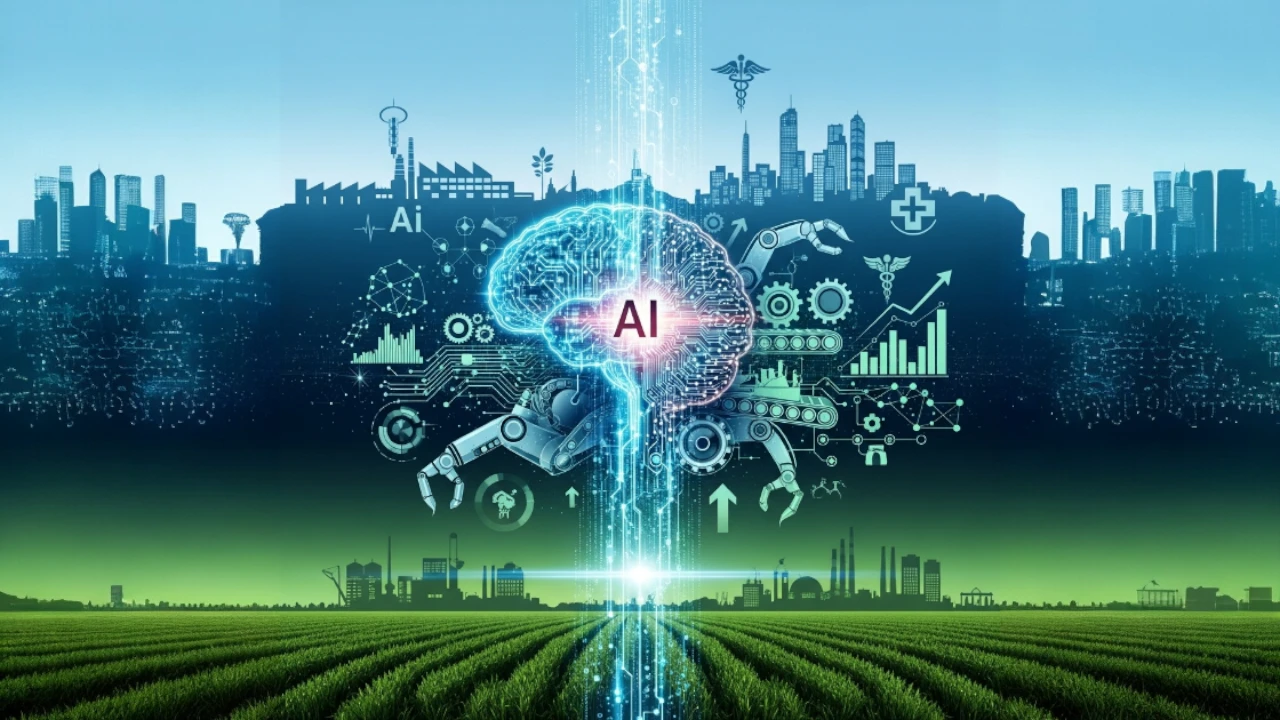In today’s fast-paced business environment, Artificial Intelligence (AI) is not just a technological advancement; it is a strategic tool that can provide entrepreneurs with a significant competitive edge. As AI continues to evolve, it offers innovative solutions that can transform various aspects of business operations, from market research and customer engagement to product development and operational efficiency. This article explores the strategies entrepreneurs can adopt to leverage AI for a competitive edge.
Table of Contents
ToggleUnderstanding AI in Entrepreneurship
What is AI in Entrepreneurship?
AI in entrepreneurship involves the use of advanced algorithms, machine learning, and data analytics to automate processes, gain insights, and make informed decisions. This technology enables entrepreneurs to optimize their operations, enhance customer experiences, and innovate more effectively.
The Evolution of AI in Business
AI’s journey in business began with basic data analysis and has now evolved into sophisticated applications such as predictive analytics, natural language processing, and real-time customer interactions. This evolution has significantly enhanced the capabilities of entrepreneurs, allowing them to deliver more targeted and impactful solutions.
AI Strategies for Market Research and Analysis
1. Automated Data Collection and Analysis
Leveraging Big Data
AI can automate the process of collecting and analyzing vast amounts of market data. By leveraging big data, entrepreneurs can gain valuable insights into customer behavior, market trends, and competitive landscape. This allows for more accurate and timely decision-making.
Predictive Market Trends
AI can predict future market trends based on historical data, helping entrepreneurs anticipate changes and adapt their strategies accordingly. This proactive approach ensures that businesses stay ahead of the competition.
2. Customer Segmentation and Targeting
Personalized Marketing Campaigns
AI can analyze customer data to segment audiences based on behavior, preferences, and demographics. This enables entrepreneurs to create personalized marketing campaigns that resonate with specific customer groups, increasing engagement and conversion rates.
Behavioral Analysis
AI can track and analyze customer interactions across various touchpoints, providing a comprehensive view of customer behavior. This information helps entrepreneurs tailor their marketing strategies to meet the needs and preferences of their target audience.
Enhancing Customer Experience with AI
1. AI-Powered Customer Support
Chatbots and Virtual Assistants
AI-powered chatbots and virtual assistants provide instant customer support, answering queries and resolving issues in real-time. These tools use natural language processing to understand and respond to customer inquiries, improving the overall customer experience.
24/7 Availability
AI-powered customer support tools are available 24/7, ensuring that customers can get assistance whenever they need it. This enhances customer satisfaction and loyalty.
2. Personalized Customer Interactions
AI-Driven Recommendations
AI can analyze customer data to deliver personalized product recommendations. This includes suggesting products based on past purchases, browsing history, and preferences. Personalization enhances customer satisfaction and increases sales.
Dynamic Content Personalization
AI enables the creation of dynamic content that adapts in real-time based on user interactions. This means that the content a user sees can change based on their behavior, ensuring a more relevant and engaging experience.
AI in Product Development and Innovation
1. AI-Driven Innovation
Identifying Market Gaps
AI can analyze market data to identify gaps and opportunities for new products and services. This allows entrepreneurs to innovate and create solutions that meet the needs of their target market.
Rapid Prototyping and Testing
AI can accelerate the process of prototyping and testing new products. By simulating different scenarios and analyzing the results, AI helps entrepreneurs refine their products more quickly and efficiently.
2. Enhancing Product Features
AI-Powered Product Enhancements
AI can be integrated into products to enhance their features and functionality. For example, AI can be used to create smart home devices that learn and adapt to user preferences, providing a more personalized experience.
Continuous Improvement
AI can continuously monitor and analyze product performance, providing insights that can be used to make ongoing improvements. This ensures that products remain competitive and meet the evolving needs of customers.
Optimizing Operations with AI
1. Automating Routine Tasks
Streamlining Business Processes
AI can automate routine tasks such as data entry, scheduling, and inventory management. This streamlines business processes, reduces errors, and frees up time for entrepreneurs to focus on strategic activities.
Improving Efficiency
AI can optimize operations by identifying inefficiencies and suggesting improvements. This includes everything from optimizing supply chain logistics to improving production processes.
2. Predictive Maintenance
Reducing Downtime
AI can analyze data from equipment and machinery to predict when maintenance is needed. This proactive approach to maintenance reduces downtime and extends the lifespan of equipment, saving businesses time and money.
Enhancing Operational Reliability
Predictive maintenance ensures that equipment operates reliably, reducing the risk of unexpected breakdowns and disruptions. This enhances overall operational efficiency and productivity.
AI in Marketing and Sales
1. Targeted Marketing Campaigns
Creating Highly Targeted Ads
AI can analyze customer data to create highly targeted marketing campaigns. This ensures that marketing messages reach the right audience at the right time, maximizing the return on investment.
Optimizing Ad Spend
AI can optimize ad spend by analyzing the performance of different campaigns and allocating resources to the most effective ones. This ensures that marketing budgets are used efficiently and effectively.
2. Sales Forecasting
Predicting Sales Trends
AI can predict future sales based on historical data and market trends. This helps entrepreneurs plan their sales strategies and allocate resources more effectively.
Improving Sales Performance
AI can analyze sales data to identify patterns and trends, providing insights that can be used to improve sales performance. This includes identifying the most effective sales tactics and strategies.
The Future of AI in Entrepreneurship
AI and Blockchain Integration
Enhanced Security and Transparency
The integration of AI and blockchain technology can enhance security and transparency in business operations. Blockchain provides a secure and transparent way to track and verify transactions, while AI can analyze this data to optimize business processes.
Smart Contracts
AI-powered smart contracts can automate and enforce contractual agreements, reducing the need for intermediaries and increasing efficiency. This innovation has the potential to revolutionize industries such as real estate, finance, and supply chain management.
AI and the Internet of Things (IoT)
Connected Devices
The combination of AI and IoT enables the creation of connected devices that can collect and analyze data in real-time. This allows entrepreneurs to monitor and optimize their operations more effectively.
Predictive Maintenance
AI can analyze data from IoT devices to predict when maintenance is needed, reducing downtime and extending the lifespan of equipment. This proactive approach to maintenance can save businesses time and money.
AI and Augmented Reality (AR)
Enhanced Customer Experiences
AI and AR can create immersive customer experiences that go beyond traditional interactions. For example, AR can allow customers to visualize products in their environment before making a purchase, while AI provides personalized recommendations based on user preferences.
Training and Education
AI and AR can also be used for training and education purposes. For example, AR can create realistic simulations for training employees, while AI can provide personalized learning experiences based on individual needs.
Conclusion
AI is revolutionizing entrepreneurship by providing innovative solutions that enhance efficiency, personalization, and overall business success. From AI-powered market research and customer experience to product development and operations, AI offers numerous benefits that can help entrepreneurs stay ahead of the competition. As AI technology continues to advance, entrepreneurs must stay informed and leverage these innovations to drive their businesses forward.
FAQs
1. How can AI improve market research for entrepreneurs?
AI can automate data collection and analysis, providing valuable insights into customer behavior, market trends, and competitive landscape. This allows for more accurate and timely decision-making.
2. What are the benefits of AI-powered customer support?
AI-powered customer support, such as chatbots and virtual assistants, provides instant responses to customer inquiries, improving customer satisfaction and reducing response times.
3. How does AI enhance product development?
AI can analyze data to identify patterns and trends, informing product development. It also accelerates prototyping and testing, allowing for quicker and more efficient product refinement.
4. What role does AI play in marketing and sales?
AI can create targeted marketing campaigns and predict future sales, helping entrepreneurs reach the right audience and plan their sales strategies effectively.
5. How can AI optimize business operations?
AI can automate routine tasks, improve efficiency, and reduce costs in areas such as inventory management, logistics, and supply chain optimization.
6. What is the potential of AI and blockchain integration?
The integration of AI and blockchain can enhance security and transparency in business operations, with applications such as smart contracts automating and enforcing agreements.
7. How do AI and IoT work together?
AI and IoT enable connected devices to collect and analyze data in real time, allowing for more effective monitoring and optimization of operations.
8. What are the applications of AI and AR in business?
AI and AR can create immersive customer experiences, such as virtual try-ons, and provide realistic simulations for training and education purposes.
9. How can AI-driven predictive maintenance benefit businesses?
AI can predict when maintenance is needed based on data from IoT devices, reducing downtime and extending the lifespan of equipment.
10. What are the key trends in AI for entrepreneurship?
Key trends include AI-powered market research, personalized customer experiences, AI-driven product development, targeted marketing, and the integration of AI with blockchain and IoT.























